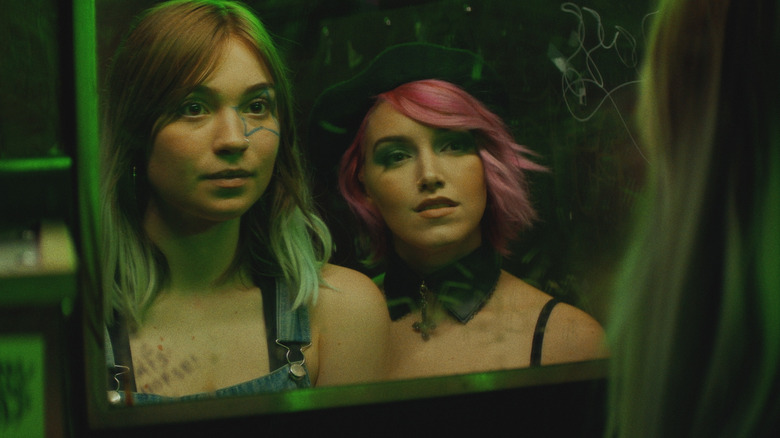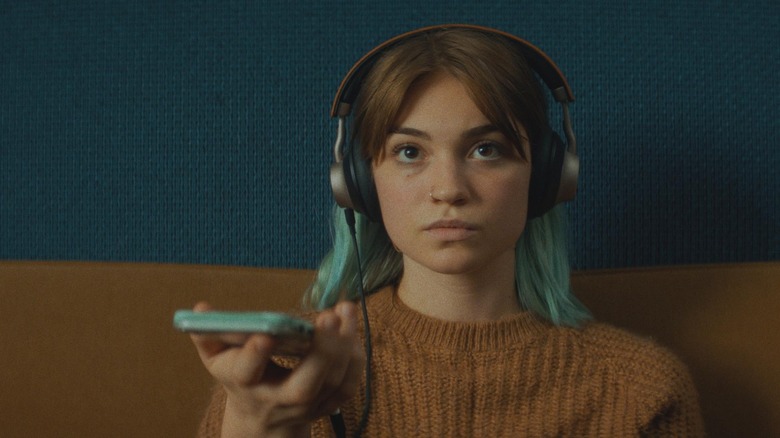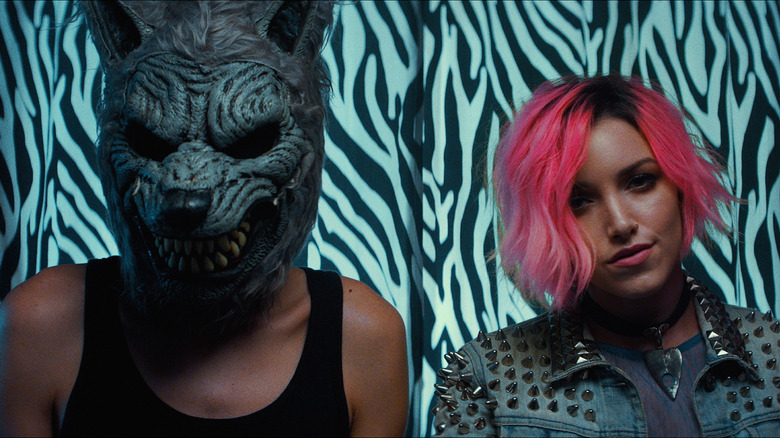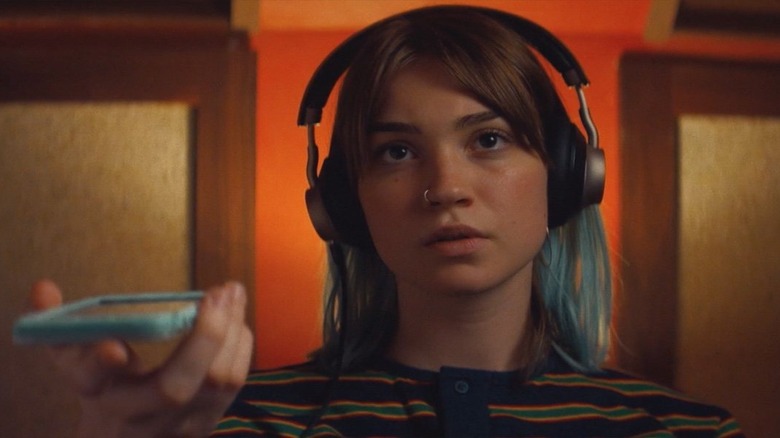Poser Filmmakers Ori Segev And Noah Dixon Show Love For Columbus, Ohio [Interview]
"We're excited to show the world Columbus, Ohio."
Directors Ori Segev and Noah Dixon bring the city's art scene to light in their low-key thriller, "Poser." Lennon Gates (Sylvie Mix) is a podcaster and an artist without a voice, but she becomes obsessed with one voice in particular. The wallflower sets her sights on the lead singer of Damn the Witch Siren, Bobbi Kitten. With shades of "The King of Comedy," Lennon starts to emulate and stalk the artist.
It's a story already widely embraced by the community in Columbus, Ohio. Last weekend, the film opened in the city and made $15,250 at one theater, the Gateway Film Center. Now, "Poser" is expanding to New York and Los Angeles before opening in additional theaters. Recently, Segev and Dixon talked to us about their love of Columbus, filming the city, and lessons from their feature directorial debut.
'We definitely have our roots here'
What's your relationship with Columbus?
Dixon: I grew up in Springfield, Ohio, and then I met Ori. We went to school together at Denison University, which is a small liberal arts school that's outside of Columbus. We met at school and studied film together and just worked on projects there. After we graduated, we moved to Columbus because it was the closest city, and we just wanted to continue making films together. So, we started a production company. We're still here.
Do you foresee telling more Columbus stories?
Dixon: We definitely have a solid crew here. The artists that we've worked with and the crew and the film people that we made this film with, we really like. We do work all around and we're open to do projects anywhere, but we definitely have our roots here.
Segev: It's such a good place to have our homebase. It's affordable. We can make a movie like this. Besides the subject matter, we could have never made this movie in a big city. It just wouldn't have worked, getting the locations, being able to shoot at all our favorite venues...
What are little details that are very specific to Columbus that anyone from the city will recognize?
Segev: I think a lot of that comes through in little things in the VO where she says "Old North." If you're from Columbus, you know exactly where that is, but it also could sound like a place in any city. I think the overall vibe of being in a Midwest city, there's a lot of really creative people and there's opportunity here for them to have a warehouse or do these things that you couldn't do in a big city. I think that this film highlights a lot of those things that if you're from here, you've probably gone to that party at that warehouse. Most Midwest cities have something like that.
Is that a similar creative community as depicted in the movie?
Segev: Oh, totally. Those are all our friends.
Dixon: We made the movie with, like Ori said, just real bands and our friends, but I think because it is a smaller scene, there's more crossover between genres too. If you're in New York or L.A., or these bigger cities, there's a punk scene and those are all the punk bands, but because Columbus is smaller, you see a lot of different types of musicians collaborating and you'll go to a show and see a bunch of different types of musicians. I think because of that, it's definitely a smaller scene that everybody knows each other in some way or knows people in the same circles.
Are there a lot of filmmakers there, too?
Dixon: It's definitely small. The people that we know and are incredibly talented, we couldn't have done [it] without all the people we worked with.
What were some of the venues you shot?
Segev: We shot at this one place called Cafe Bourbon Street, which is a great little local bar and venue. We shot a couple scenes there. We had a house that we turned into the party house for the film, a house that I had rented, but I wasn't living in it. We shot at this restaurant called Commune. That's fantastic.
Dixon: Our experience being in the music scene here in Columbus is just going to a lot of house shows or warehouse shows. So, a lot of the warehouse concerts that are in the film were inspired by this real art space called MINT Gallery that used to be a thing in Columbus, but got shut down.
After we graduated school, that's where we just went to see a lot of shows, went to a lot of parties. There's just a lot of interesting art, music, so the warehouse stuff was inspired by that. There's a cool warehouse here in Columbus called Fortner that has artist space and shows. All of it's in Columbus and most people watching the film from Columbus would recognize a lot of these spots.
'We've dreamt of making a film our entire lives'
Since the musicians in the film are your friends, how did you visually and audibly want to get their music just right for the live performances we see?
Segev: A lot of the tracks we had picked out beforehand. We knew we were going to use the recording, so we had it playing on a boombox while we were shooting. We also wanted it to feel authentic, so we tried to light it in a way that felt both cinematic but really natural to what you would see at a show, which is sometimes just a light in the back or whatever the band could find to make their show look sick.
We try to keep that authentic vibe with everything that we shoot. Some of the footage in the film was archival stuff. We had originally planned to maybe shoot more concerts, but right when we wrapped filming, and we filmed in October 2019, the pandemic hit. We thought we'd be going to all these shows and getting new footage of more of the bands and we didn't really do any of that, so we went through our archives. We had shot tons of these bands already and we were able to sprinkle that stuff into the film.
The movie doesn't really mock any of the artists in the film, but it does feel like they all have good senses of humor about themselves. How'd you want to have fun with certain characters from that scene without satirizing or mocking?
Segev: I think we're making fun of what it is to be an artist and poking fun at ourselves and having fun with our friends. We told everyone that they'll be playing a version of themselves, but they can exaggerate that version and make it fun.
Dixon: I think it definitely helped that we're friends with most of these artists and already had a good relationship with them. I think the artists and musicians in Columbus do have a good sense of humor about that stuff and it's both a love letter to the music scene, but also poking fun in that balance. I think everybody knew before we started shooting what we were trying to get at with that vibe and the humor there.
The musician with the wolf mask seems very self-aware about it.
Dixon: He was so excited.
Segev: He's the best.
Dixon: He's a great guy. We started with them. Before we knew what the stories or who the characters were, we knew we wanted to make a film and cast the bands and musicians that we worked with. Ori and I have made so many music videos and music documentaries here in Columbus and it just felt like, "Oh, a lot of these musicians feel they deserve to be in a movie." Damn the Witch Siren, Bobby Kitten and Z Wolf's band, just seemed the first people that came to mind, like, "Oh, these feel like movie characters." Visually, they're such interesting shows to go to because they have such an incredible energy and vibe. So, we started with Bobby and Z and their band, Damn the Witch Siren, and then built the story around them.
Where did [the protagonist] Lennon come from, then?
Dixon: I feel there's definitely that general vibe at certain art things you go to, like, "Oh, is this real or is this fake, or how is this original?" It's questioning your creative identity. We've definitely met people like that, but also at times, I feel like you feel like that a little bit when you're in your young 20s and figuring yourself out at parties. I think that all stemmed from that and the antithesis of Bobby and her super confident and charismatic personality that just shines through. That's how Lennon came through.
What were your expectations for making your first movie? How did the reality of it compare?
Segev: I think our expectations where we were just realized that we needed to make a movie to prove that we could make a movie, so that we could make more movies. This was the first one and when we were talking about ideas, as soon as Noah pitched this idea, just the basis of it we were like, "This is doable."
We definitely couldn't make a crazy sci-fi movie for our first movie. This is like, "Everything we need is right here. We know this so well." We were expecting ourselves to make a ton of mistakes. We overshot everything. Something Noah and I do really well is rather than argue about how to do something, we just shoot it both ways because we're both editors and we're like, "Let's just have both options, we don't need to talk about this for 20 minutes. You could shoot it." Doing that allowed us to have everything that we needed to cover our tracks in the edit.
Dixon: We've dreamt of making a film our entire lives. So this is something we've been building up to for a while, but I think we have been patient about it. After graduating, we started our production company and did a bunch of shorts and documentary stuff and music videos and a lot of commercial stuff and just spent all of those years practicing. I think we knew when it was the right time to jump into the story and make the feature.
There's always stuff that goes wrong, and I think we were planning for that, but all in all, we're a little bit surprised by the outcome of all of it. I think getting into these festivals and getting to show it around the world, it's all been better than we'd even expected. We're excited by the whole ride and excited to jump into the next one.
Segev: I would've been happy with one Columbus screening.
'Every single day on set was a new experience'
Like you guys said, it was a practical debut to make, but why specifically this story? You didn't rush making your first movie, but was there something about this idea that just made you think, creatively, "This is our first?"
Segev: Even as we were talking about it, we really felt the drive to make this movie first because we're a little older now, but we're still part of this scene of people here. We wanted to make the film while we were still in it, not looking back on it and reminiscing. That was what ultimately drove us to [say], "We got to make this right now." Among a lot of other things, but that was one thing.
Any nervousness showing the movie to people in Columbus?
Dixon: A little bit. At this point, it's been nice going to all of the festivals, because it's really broken us in on how that all goes down. Some festivals you have just a really small audience with a couple people and some that are really big and we do all these Q&As. I definitely think there's always a little bit of nerves just at anything because it's our first time making a feature and showing it to people. I feel we're still getting used to it a little bit.
As far as the Columbus audience goes, from the beginning they've been so supportive and excited. There's definitely a lot of films that come out of Columbus, but it feels like a new wave of artists and musicians and talent getting shown on a national or international level, which is exciting for everybody. There's been so much support. A little bit nervous any time showing it, but Columbus specifically, there's been nothing but support.
How did Lennon's point-of-view influence how you moved the camera?
Segev: There's a lot of ways that Sylvie Mix, the actress, could have played the role. There was so much empathy. She's doing these things that are creepy, but you get them and it's not as creepy and you really feel the same thing she's feeling. She just brought all of that. We were filming, I think it was the second or third day of shooting, Noah and I were talking. We just realized that these things that we thought were going to be so creepy just weren't and we need to lean in on this more. That was something that influenced the filmmaking from day three. We can really hold the frame for a lot longer, even mundane things like being in the mirror. They were interesting and we could hold on to her face, so we knew this scene is going to work really well just with this stuff and we don't need to do anything flashy here.
After this experience, what are some more lessons that you want to keep in mind for your next movie?
Dixon: We're already gearing up and trying to get the next one underway, and there's been so many things that we've talked about. Definitely give ourselves some more time in pre-production. Once we came up with a script and the idea for this one, we just jumped right into pre-production or right into shooting, maybe a month or two of pre-production.
Segev: I could have used three months.
Dixon: We feel we could have done more planning, but just the little things of how to work with the talent. Every single day on set was a new experience, and it was our first time doing this.
Segev: This is more a general thing that we take to all of our sets, but the vibe on set is so important, especially with everybody that's asking anyone else to do something. As soon as you can tell that I'm stressed out and it's not a good vibe for other people, that's not a fun time for anybody else. This is really important. Even when sh*t's hitting the fan and everything we had planned isn't going right, keep your cool, take a second and keep going super confidently. It creates a fun environment that people want to work in and a good memory for them and you get a better product from that, too, when everyone's into it. So, keeping that vibe across the whole set. Sometimes we'll call a vibe check and make sure that everyone's feeling good, nobody needs anything. Those five minutes of checking in goes a long way.
"Poser" is now playing in limited release.



